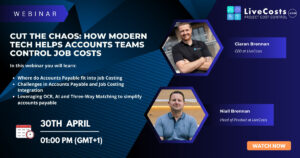Episode 30 – Eric Anderton
Construction Purpose, People, Strategy, Systems & More with Eric Anderton
Eric Anderton is the host of the Construction Genius Podcast. Eric has also worked with construction companies since 2004. His clients include Teichert Construction, Level 10 Construction, Deacon Corp, MarketOne Builders, Cook Engineering, Tricorp Construction, and many others.
Podcast Highlights
What does a good strategic plan look like for a construction business?
Ciaran:
We could talk on that business purpose bit probably for the rest of the episode, but let’s move through the statement. Building strategic plan, I think a lot of people fall down here, I think a lot of people fall down. And construction companies, give them a plan of a project and they’ll deliver it, give them the plan on a business and suddenly it becomes very complicated and very foggy, is probably the best way I can describe it. Can you describe what a good strategic plan looks like for a construction business?
Eric:
Yeah, this is one of my favourite areas of discussion. Construction companies don’t go out of business because of too little work, they go out of business because of too much work or the wrong type of work, the wrong projects. And this is a 30,000 foot level, if you’re going to build a strategic plan, you have to ask and answer these three questions, right client, right project, right location. If you don’t know the best types of projects you should be building and the types of clients you want to work with and the locations you want to work in, if you’re not clear on that, you’ve got to stop everything and you’ve got to get clear on that. Because if you look at the jobs in your business that are making money or losing money, if they’re making money, they’re hitting at least two of those three things, right client, right project type, right location.
If they’re losing money, they’re losing money because you’re not hitting two of those three things. And the best companies, they know the answer to those three questions and they only pick projects that hit at least two of those three things and most of the time, the three of those three things.
Ciaran:
Yeah, good. No, I like that. Why should we have the plan in place? Why should we do this? And how often should we review it?
Eric:
Excellent. Your plan is a filter. So, if you know, right client right project, right location, it filters opportunities in and out of your company because if you’ve got half a clue, and if you’re a good business, you’re going to have opportunities coming at you all the time. And especially when you’re perhaps just starting out or beginning to grow your business, your default is to say, “Yes, yes, yes, yes.” When in fact your default should be to say, “Maybe,” or perhaps even, “No,” because it’s the projects that you don’t take on that allow you to build the strength of your business, as opposed to the ones that you do take on, that cause you to lose a bunch of money or distract you from the main purpose of your business or the main focus of your business. And so, the whole idea of a good strategic plan is to filter opportunities and then to give you a clear idea of what you need to be focused on every morning as you come to work, as you’re running the business, working on it as opposed to just working in it, building the projects.
Who in your construction company should be involved in developing a solid strategy plan?
Ciaran:
Let’s use that company as an example. It’s good to bring real-world examples into this. If I’m a company today, and I’m… Maybe it’s the COVID situation has made me consider my location. Maybe I’ve got to start looking at new markets. In the company, who should be involved in creating this solid strategic plan?
Eric:
Very good question. If you think about, in a construction company, you basically have four things that you have to do. You have to bid the work, you have to build the work, and then you have to get paid for it or bill the work. In the bidding, I think of the business development and the estimating. In the building, I think of the project management, the planning of the project, and then in the field. And then, the billing is obviously the folks who chase the money, accounts receivable, accounts payable.
When you’re doing strategic planning, in my view, you should have representatives of each one of those areas of the business in the meeting. You should be able to get their input and their feedback because all of them have something to say about right client, right project, right location, and you want to be able to get their feedback and their input. You always want to have people in those meetings who have skin in the game. You don’t want to just have people in the meetings who are just kind of casual. You’re not inviting people to a strategic planning meeting to build their morale, or as a courtesy. You’re bringing people in who really are committed to the success of your business.
Because that’s what a strategic plan is. It’s the answer to the question, how are we going to succeed? If you keep it that simple, it’s going to help you to get through some of the complications that often come with strategy. Just keep focused on that one question. How are we going to be successful?
What can a construction company do to attract & retain top talent to their company?
Ciaran:
Developing the best people. This is interesting, because working in construction and construction companies, the big talk, there’s always just a shortage of skilled labor and great labor and great talent. And it’s an issue and it travels globally, there’s absolutely no question about that. So what kind of construction company do attracts top talent to the companies?
Eric:
The first thing they can do is to identify their purpose and their values. I really believe that, because what those do is they serve as a magnet to attract the right types of people and then to repel the wrong types of people. And that includes the right types of clients and the wrong types of clients. So get clear on your purpose and your values, so that when you’re interviewing people and when you’re thinking about bringing someone on, you’re able to structure the interview in such a way, so that you can ask questions and explore what their values are and how they align or misalign with yours.
Because one of the ways that people fail in construction, in terms of hiring and bringing people on, so they bring someone on who’s talented, but they don’t share their values. And as a result of that, there’s a disconnect and it has a negative impact on the business. So the first step is to get clear on those values.
The second step is to look for the will, as opposed to the skill. And what I mean by that is, you can develop skill, but often it’s difficult to develop will. If someone doesn’t want it, in other words, if someone doesn’t have that internal drive, it’s difficult to get that in someone. You can always develop skills, but will, attitude in other words, that alignment with your values, you’ve got to really think about how to get those two things, in terms of your interview process, how do identify those two things. So that then you can build on those with the skill development, as they come into your company.
Ciaran:
Yeah. That’s such an interesting point. So, I’m a carpenter by trade, spent many years as a carpenter. And I remember having one of my first bosses saying to me, “We can teach you carpentry, but we can’t teach you to come in here and work hard. You’ve got to do that bit yourself.”
Eric:
Yes.
Ciaran:
And I always remember that. And that’s a value I suppose. That’s stuck with me through the years, that that peace is something that’s got to be in you and it’s got to be something that you drive and other bits and skills will come to you and can be taught, I suppose. So, if that’s how you attract them, attract this great talent into a company, what about retaining them?
Eric:
Yeah, that’s a great question. So, you know that your best people right now, here in the US, you know that your best people are getting calls every week from head hunters, from recruiting agencies, maybe from their friends in other companies. And the war for talent is extremely fierce.
Ciaran:
So the way that you retain them, is by staying true to your values, making sure that they have an environment where they’re allowed to thrive, making sure that you’re not allowing the negative people, the under performers, the entitled people to get the preeminence in your business. Don’t allow that at all. Create a meritocracy in your organization, where the best players will thrive, will get rewarded and will understand that they have a future in your business. Because the war for talent is ongoing in construction, it will never end and you have to be able to set up an environment, where top talent will want to stick with you for the longterm.



